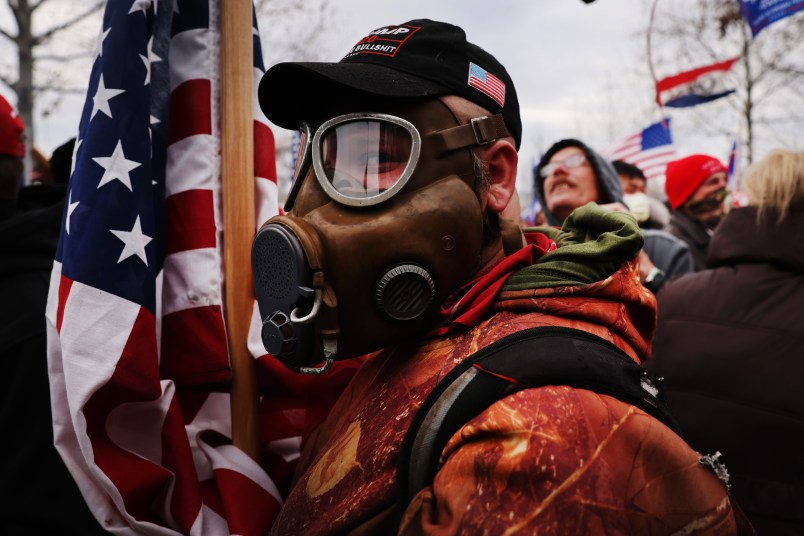“I ain’t goin to jail,” Cleveland Meredith allegedly wrote in a text message last Thursday. ‘The morgue maybe, not jail.”
Meredith didn’t get his wish. He was arrested in Washington, D.C. the same day and now faces weapons charges — he allegedly had guns and thousands of rounds of ammunition — as well as a count of transmitting a threat in interstate commerce.
Among other things, Meredith allegedly mused about putting a bullet in House Speaker Nancy Pelosi’s “noggin’.”
But Meredith is in a small minority — that is, the list of potentially violent extremists in D.C. last week who are actually in police custody. Most who participated in Wednesday’s attack on the Capitol remain at large.
Many are heavily armed, and they’re likely aware that federal authorities are looking for them.
Also at large: Those who cheered on the attack from the sidelines and may have been inspired to commit their own acts of terror. Amid scrutiny from law enforcement and disruptions to traditional communications platforms like Parler and Twitter, some of these actors have “gone dark” and taken their discussions offline or deeper into parts of the web not easily accessed by law enforcement.
As troops lock down Washington, D.C. for Joe Biden’s inauguration and law enforcement keeps a close eye on planned demonstrations at state capitols this weekend, both groups — those who are sought by law enforcement, and those who were inspired by Jan. 6 — have observers worried about the potential for an uptick in violent attacks by individuals.
“What we’re more worried about is the individuals and groups that have gone dark — underground — at the moment, and the potential for them to commit acts of terror,” Devin Burghart, executive director of the Institute for Research & Education on Human Rights, told TPM.
The “Stop the Steal” movement had held rallies for weeks in states across the nation, then the President beckoned his supporters to the D.C. event Wednesday by promising the night prior that he would address the crowd in front of the White House.
Burghart, whose group tracks and analyzes far-right movements, drew a contrast with the build up to last week’s insurrection and the new threat that his group is tracking: That, for extremists and those now facing arrest, the appeal of terrorism will grow.
“There will be a fraction of those mobilized by the insurrection who decided that it’s time to take things into their own hands and kick things off,” he said.
A recent law enforcement bulletin from the National Counterterrorism Center, the Justice Department and the Department of Homeland Security flagged the risk of one-off attacks by domestic violent extremists and members of militia groups in the wake of the Capitol breach, The New York Times reported Wednesday night.
The violent revolutionary fantasies of some militia group members and “boogaloo” adherents “may contribute to DVEs’ willingness to carry out sporadic, lone actor or small cell violence,” the bulletin warned.
On semi-public messaging apps like Telegram, it’s not difficult to find open discussion of tactics for committing acts of right-wing terrorism. Though such chatter was common even before the Capitol attack, the events of the past week have inevitably changed the tone of the discussion.
In one post to an armed right-wing group’s chat room that TPM reviewed, for example, a user lamented that the group would be “slaughtered” if they attempted to attack the Capitol again.
“We must start with soft targets who are not prepared,” the user wrote.
“There is a certain risk that what we see play out in the future could happen in a less predictable and decentralized manner, in methods that could include small groups or individuals taking matters into their own hands,” said Jared Holt, a visiting fellow at the Atlantic Council’s Digital Forensic Research Lab focused on domestic extremism.
Between the ongoing wave of federal arrests and the accompanying scrutiny of online extremist communities, Holt said, “a lot of this, going forward, is going to be a lot harder to predict.”
Steven D’Antuono, the assistant director in charge of the bureau’s Washington field office, put on a brave face during a press briefing Tuesday: “Even if you’ve left D.C., agents from our local field offices will be knocking on your door if we find out that you were part of the criminal activity at the Capitol.”
Beyond that, the FBI declined to comment to TPM when asked about the steps it would take to arrest the gun-toting radicals who stormed the Congress.
Burghart told TPM that he expected a “rocky week” ahead, but said the greater task was ideological.
“We’ve got a long-term challenge ahead of us,” he said, “to try to uproot what’s fueling this, the kind of violence that is the logical conclusion of the rhetoric that these folks have been fed for so long.”







Ike made it work with the National Guard. After seeing Guardsmen and -women in the Capitol taking selfies with the statue of Rosa Parks, I’d say governors can make that work again. I wouldn’t mind seeing these white supremacist ammosexual assholes take live fire from BIPOC Guards–it would be exceptionally fitting.
My fear is that with larger armed cosplay events being tamped down, we’ll see a sharp increase in attacks of the sort that Gabby Giffords suffered.
So basically, we’re heading into a version of America that echoes Iraq’s post-invasion military vs. asymmetrical insurgent threat, but with a pandemic? What is the endgame with all this?
“We must start with soft targets who are not prepared,” the user wrote.
Post offices, Social Security Offices, etc., National Park Service and US Forest Service would be likely targets.
Just heard the numbers of Repubs who want Trump in 2024.
Why not ask these fine folks if they are in favor of Trump inspired riots for the next four years.